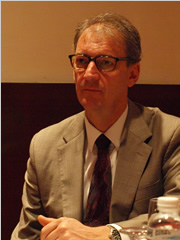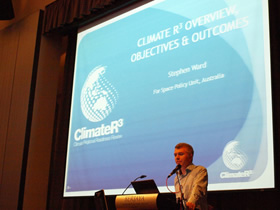Interview with Dr. Michael Green, General Manager, Space Policy Unit, Department of Industry, Innovation, Science, Research and Tertiary Education of Australia, at APRSAF-19 in Kuala Lumpur (Dec 2012)
<Part 2>
Continued from part 1
S: In the EO WG yesterday, you proposed to study those relationships.

In that case, in particular, working with the APEC climate center, APRSAF is a forum of space agencies who are often data providers. So they are helping build those connections by the personal effort and on the initiative level in terms of what data can do and can be provided from whom and how, and what the APEC climate center needs in terms of its data information to support its work. On the strategic level, Australia sees APRSAF as a useful forum to bring together the space agencies of the region to understand and contribute to the key agendas they have established through bodies like APEC and ASEAN and other regional coordination mechanisms. So when issues like, let's say, disaster-management response or climate change get raised in those forums and have initiatives coming out of them, we see APRSAF as a useful mechanism for engaging and coordinating the response of regional space agencies to those climate agendas.
S: So you think the space agencies in the Asia-Pacific region have more to do for problems like climate change or the environment.
Well, I think space agencies around the world are moving away from the environment where they are supported, in a sense, as technological organizations, where they are funded to undertake technically demanding tasks for their own sake or for scientific research and exploration. I think the trend is towards a greater focus on the way space can contribute to practical outcomes on Earth, whether it be through navigation services or telecommunication services or applications of Earth observation to agriculture, forestry, resource management, climate change, and of course, industrial and economic outcomes. So I think we do see that as a bit of trend and, in the case of CR3, part of that is to better connect the space agencies of the region to the key user needs we are given in response to climate change policy.
S: Climate change is a problem for the region and also for the entire globe. How do you think APRSAF can work on the climate change issue not only for the Asia-Pacific region but also for the entire globe? The relationship with GEO is one example, isn't it?

Climate R3 report at the plenary
As you have noted, climate change is on the global agenda, and we thought it was important for APRSAF to have a high profile, specifically climate-change-related initiatives. So CR3 was launched to fulfill that role. Another thing that we think is important for the Asia-Pacific area is to have a clear view of what it needs and what its interests are in terms of data, the missions, and the requirements that it has, so that we can be more influential in global forums. The Europeans as I said before are very well organized through the collaborative and cooperative relationships they have. America obviously has significant priorities and can coordinate its own requirements in terms of those issues. But I think the Asia-Pacific region needs to work better to understand collectively what its interests are in these forums. It is all very well to go individually to these forums, but I think we could be more powerful and more influential if we could identify those areas where we can speak with a common voice about our needs and our interests.
S: The future role of APRSAF is to gather the opinion of the region to disseminate Asian opinions or Asian initiatives to other part of the world.
We certainly say that a role we think APRSAF could usefully undertake is to help identify and communicate an Asia-Pacific space agenda: what areas we are interested in, what are our objectives, what we can try to do collectively. Not everything, of course—each country has its own particular interests—but where we can identify the things we all agree are unique to our regional requirements. I think a great example is the rice crop monitoring initiative where ninety percent of the world's rice crop is grown and consumed in Asia. So the Asian community has a special interest in ensuring that it understands and has systems in place to properly monitoring and predict the rice crop. There are challenging conditions that were discussed in the EO WG yesterday on this. The rice crop often grows in the rainy season, and so, that is a cloudy environment, which makes it relatively difficult to arrange sensors to monitor. This is an example of an issue where the Asia-Pacific region has a special interest in that particular challenge, and as part of this global initiative to monitor food production—or rice production—I think that we in the Asia-Pacific area would want to understand and ensure that we can deal with the issue effectively.
S: So, this is going to be a model. Rice crop monitoring would be a good model for solutions to other problems of the world.
I think it could be an example of a climate theme that we could identify as something where we have a special voice as the Asia-Pacific region to talk to those global initiatives and to take responsibility for as well.
S: What do you expect from APRSAF or EO WG?
I think we would like to see CR3 activities continue under the umbrella of EO WG. We think it is necessary to progress initiatives to have a greater connection throughout the year between the APRSAF annual meetings on behalf of CR3. We need to actually acknowledge that people have neither the time nor the money to go to lots of these meetings. So we think there is some value in having the EO WG meet together with CR3 and SAFE so that we all get together in the middle of the year between APRSAF annual meetings to progress the agenda that we are contributing toward.
S: Thank you.